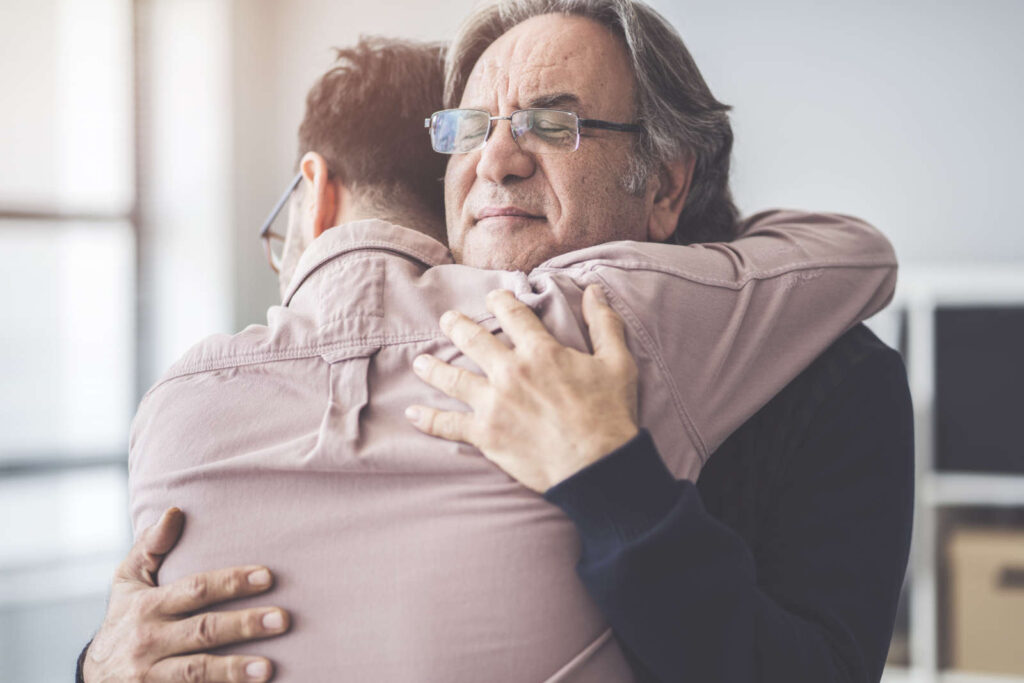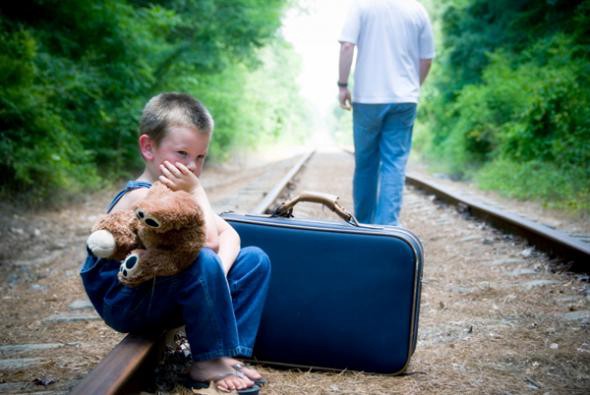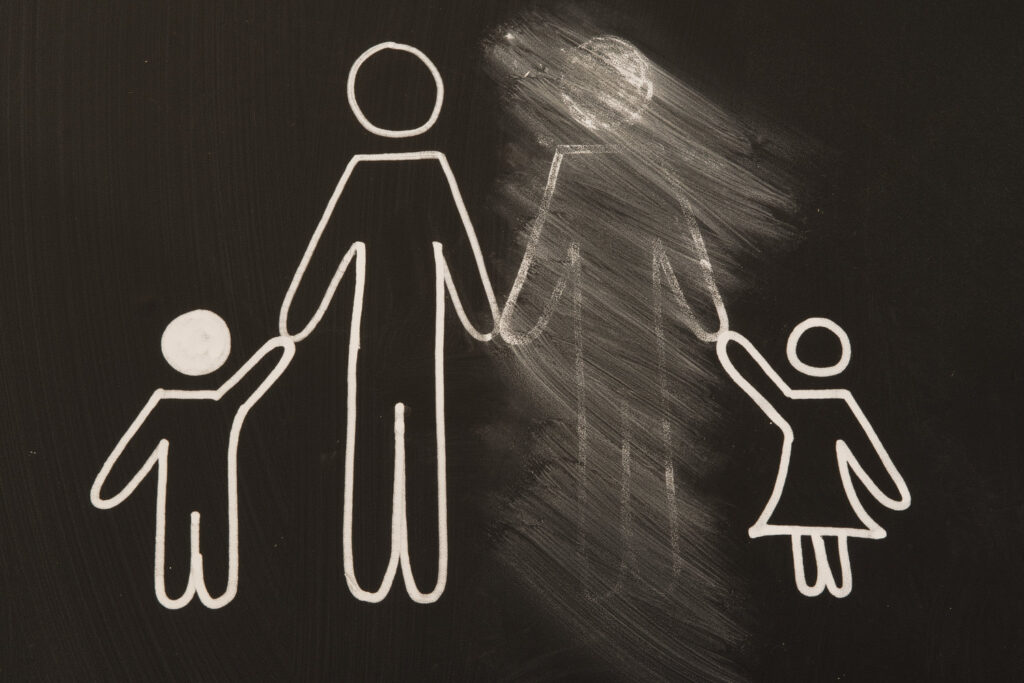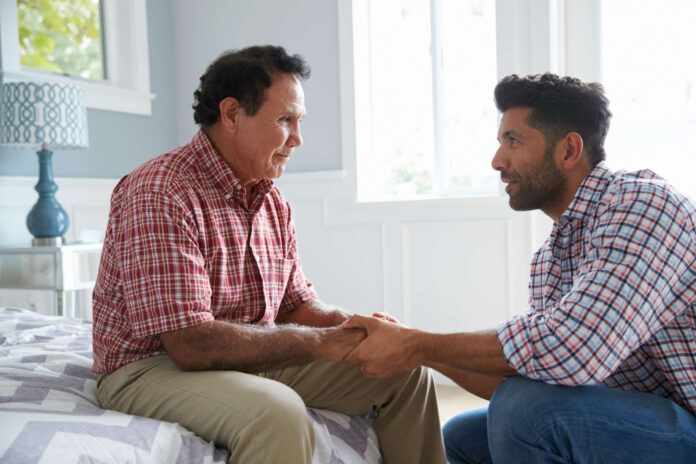It is estimated that 1 in 5 men will be diagnosed with prostate cancer during their lifetime. Today, there are over 7.4 million men in the United States who have been diagnosed with prostate cancer.
For them and their loved ones, cancer is a disease that is not only feared, but also frequently misunderstood. Although the prostate and the cancer that develops there is often associated with age and advanced life stage, the fact is that prostate cancer does not discriminate.
It is not uncommon for a father to feel remorse about harming his children and relationships with other men. Dad may want to ask forgiveness, but he may not know how to do it. The father wound can be defined as the traumatic experience of a child being hurt by his or her father, or a damaged bond with the father-figure.
The father wound is the term used to describe an emotional pain experienced by men as a result of the way their father interacted with them as a child. It’s an emotional scar that can be triggered when a father’s attitude or behavior towards his child leaves an emotional impression that continues to resonate. The father-son bond is one of the most powerful forces in life, which is why the wound that is created by the father is so damaging.
The father wound is mostly unseen by most adults. Due to divorce, death, estrangement, or dysfunction, children are acutely aware of their father’s absence. Children understand the anguish of a father who may not be a caring support for his family due to mental illness, alcoholism, job commitments, or physical or emotional abuse.

Humans, however, are adaptable. We get used to everything we encounter as children, and by the time we reach adulthood, the wounds have healed and we have forgotten their beginnings.
In my personal life, this was undeniably the case. My father suffered from a “nervous breakdown” when I was five years old. He was sent to Camarillo State Mental Hospital, north of Los Angeles, after taking an overdose of sleeping medications.
My mother was informed that after three years in the hospital, he would need to be hospitalized again, perhaps for the remainder of his life. My mother eventually divorced her husband and subsequently married another guy.
I eventually forgot about the sorrow of losing my father. Without the presence of a father, I learned to be self-sufficient and take care of myself, and I attempted to forge my own path to adulthood. The father wound, like other ACES consequences, does not go away simply because our conscious mind has buried the event or because we have learnt to “forget the past” and “move on with our lives.”
In my work as a therapist, I had a lot of success treating men and the women who love them. Looking for Love in All the Wrong Places, Male Menopause, and The Irritable Male Syndrome were among my fourteen books published, including worldwide blockbusters. My personal life, on the other hand, was chaotic and disordered. After my first marriage ended in divorce, I fell in love with a lady who slept with a pistol under her pillow to protect herself “against guys.” That marriage didn’t last long. I grew more enraged, maniacal, and sad.
I had many levels of resistance because I believed that as a therapist, I could address the issues on my own. Being a therapist and being a man kept me in denial for a long time. But, eventually, I sought out and received assistance. I discovered that I wasn’t alone.
“More than 20 million children live in homes without the actual presence of a father,” according to the National Center for Fathering. Millions more have fathers who are there physically but not emotionally. If fatherlessness were classed as an illness, it would be a national issue deserving of attention.”
I started to see the connections and realized that the father wound I had as a kid had a lot to do with the difficulties I had later in adulthood. “Kids have a hole in their spirit in the form of their father,” says Roland Warren, past president of the National Fatherhood Initiative. And if a father refuses or is unable to fill that void, it may leave a deep wound that is difficult to heal.” Adults who have a hole in their spirit grow up to have chaotic and dysfunctional lives. Here are five ways our lives may be harmed by the father wound.
1. We are to responsible for our father’s injury

When our father fails to provide us with the love and support we need, we grow up believing there is something wrong with us. We blame ourselves for our father’s absence, even though we know it’s irrational. We believe that if I had been a better child, my father would not have gone.
2. We acquire a shaky sense of self-worth
We may seem tough, powerful, and self-sufficient on the outside, yet deep inside we know something is lacking. We are always striving to prove ourselves to the parent we lost, even if we aren’t aware of it.
3. Our emotions are shut off from us
We live with a profound wound that we try to ignore because it is too difficult to face. We are cut off from our emotions, especially the loving and sensitive ones, since we don’t allow ourselves to experience suffering. We may be aware of what we should be feeling, yet we are often numb and closed off.
4. Addictions and various kinds of escape are common in our society

We may get addicted to alcohol, drugs, or pornography, or we may become preoccupied with our job. We tell ourselves we’re simply letting off steam and de-stressing, but what we’re actually doing is avoiding the agony of our past.
5. We become sad and take out our frustrations on others
With people we care about, we grow more irritated and enraged. We aren’t conscious that the rage we feel for our dads who have passed away is being transferred onto our loved ones. We are becoming more sad, but we are reluctant to acknowledge it.
6. We want for love but are scared to approach it

We often blame others for our misery and alienate those closest to us. We want to offer and receive love, but the ghost of our father who has passed away keeps us isolated and lonely.
Thankfully, there are some basic, though difficult, measures we can take to recover.
- Admit that you are in pain to yourself and another person.
- Accept that your actions have caused you and your family harm.
- Commit to seeking assistance and ending the cycle of suffering, escape, and more agony.
- Be open to learning about your father’s wound and how it has affected your life.
- Pose some difficult questions to yourself. When I was a kid, was my father physically, emotionally, or spiritually absent? Did I sense his absence’s pain? Is it true that I’m ready to repair the father’s wound?
- Release your feelings of humiliation, guilt, and rage. It wasn’t your fault that your father didn’t provide you with the loving support you needed. He didn’t receive it from his father, most likely.
Healing may take years, but it is well worth the effort. One step at a time is what you do. If this post has struck a chord with you, please leave a comment and contact me. You’re not on your own. I’d want to hear from you, whether you’re a wounded soldier or a family member who lives with one. The parent wound is being healed through a network of people and services. Together, we can heal. I eagerly await your feedback and inquiries.
Frequently Asked Questions
How does not having a father affect you?
I am not sure how this question is relevant to my intelligence.
How do mother and father wounds heal?
The wound will heal over time.
Is there a father wound?
Yes, there is a father wound.




